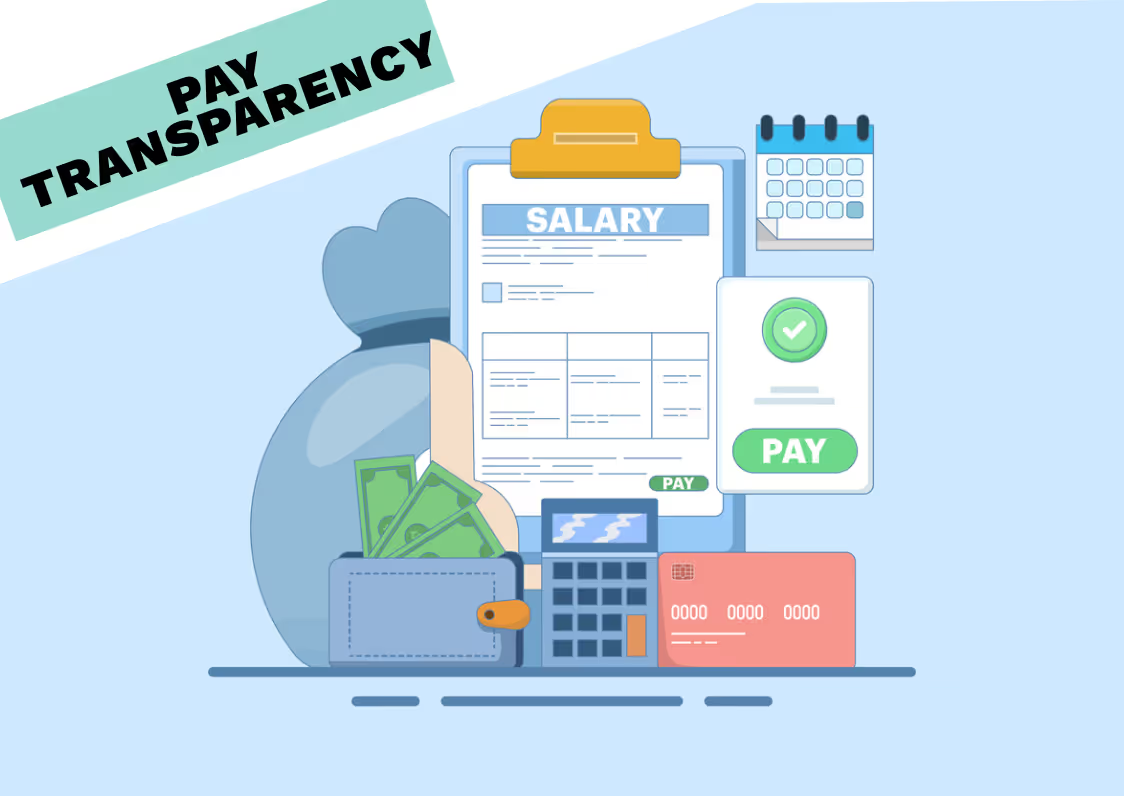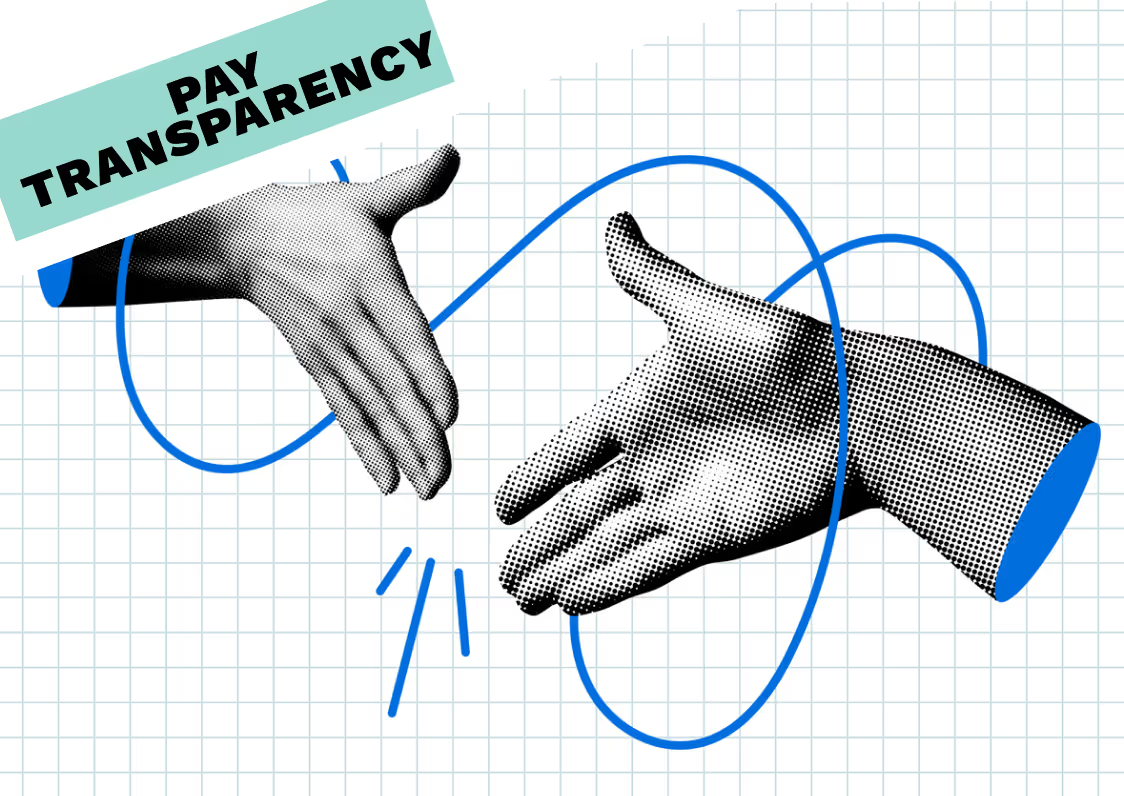The benefits of salary transparency for employees & organisations
As an HR professional, you know that salary transparency is a hotly debated topic right now. Some people believe that information about compensation should be kept strictly confidential — while others advocate for openness and honesty around pay.
We’re not going to sit on the fence on this one. It’s no secret that we’re big fans of pay transparency around here. But we don’t expect you to take our word for it either.
In this article, we’ll share some of the reasons why the global movement towards pay transparency is a positive change — for employees and employers alike.
What are the benefits of salary transparency for employers?
If you come from an organisational culture that has always considered salary information to be confidential, making the switch to a transparent approach can be difficult.
Senior leaders worry that making your salaries and pay structure transparent could have a negative impact on morale, or even cause resentment between employees.
But really, this isn’t a problem with salary transparency — it’s a problem with paying employees unfairly. And the fact is that if you’re not transparent about pay, you may already be seeing these negative effects. Research from Josh Bersin finds that communicating about compensation is more important than the salaries you actually pay when it comes to employee engagement and retention.
In other words, if you’re not transparent about pay, your employees might think they’re being paid unfairly, even if they’re not.
Here are five more benefits of pay transparency for employers.
1. Attracting and retaining top talent
Salary transparency can help you to attract and retain top talent by demonstrating a commitment to fairness and equity. The proof? In a 2023 survey by LinkedIn, 91% of job seekers said that seeing the salary range on a job post would affect their decision to apply for the job. And when they were asked which elements of the job description were most important, only the responsibilities of the role (90%) outranked salary ranges (89%).
2. Reducing the gender pay gap
In 2024, it’s simply not acceptable to pay your female employees less than their male counterparts — even if you’re not doing it on purpose. But what does that have to do with pay transparency?
Well, our own research shows that pay transparency can help to reduce an organisation’s gender pay gap. In our 2022 Figures Transparency Study, we found that:
- Fully transparent companies had an average pay gap of 0%
- Partially transparent companies had an average pay gap of between 2 and 2.6%
- Non-transparent companies had an average pay gap of 3.5%
And if you want more proof, just look at Figures: we’re proudly transparent about pay, and we recently announced that we’ve got our pay gap down to just 1%.

3. Boosting employee morale and productivity
We all like to feel that we’re being treated fairly. So it makes sense that when employees feel that their pay is fair, they’re more likely to be engaged and motivated in their work. Over time, this can improve productivity and help to create a more positive working environment for everyone.But if you’re not transparent, employees have no way of knowing if their pay is actually as fair as you claim. Worse: if you keep employees in the dark, they might assume you have something to hide. Employees can end up feeling like their pay is unfair or inequitable, even if it’s not — which can have a big impact on morale.
4. Enhancing employer brand and reputation
Being transparent about pay sends your employees a clear message: that you care about paying them fairly and competitively. Over time, this commitment to fairness can help you to enhance your employer brand and reputation — making it easier to attract the best talent.
5. Getting ahead of upcoming pay transparency laws
With the EU pay transparency directive being rolled out between now and 2026, there’s never been a better time to start thinking about pay transparency. Once the directive is in play, companies that aren’t sufficiently transparent could face sanctions and fines — not to mention a negative impact on your employer brand. Taking action now allows you to stay ahead of the curve and stand out from the competition.
{{cta}}
What are the benefits of salary transparency for employees?
In 2024, most employees have had enough of the mysterious ‘competitive salary’, and want more transparency around pay. Employees want to know that they’re being paid fairly, and to work for companies that care about making that happen. Here are five benefits of pay transparency for employees:
1. Encourages fairness and equity
When salaries are kept confidential, it’s easy for inequities to occur — even when everyone is acting in good faith. For example, two employees with the same job title and responsibilities could be paid vastly different salaries, simply because one of them negotiated better on hiring. Pay transparency encourages fairness and equity by providing employees with a clear understanding of how much their peers are earning. This ensures that everyone is paid what they’re worth — regardless of factors like their gender or race.
2. Boosts employee morale
When employees understand that there’s a proper process behind their pay, they’re more likely to feel valued and respected. By contrast, those who feel that their employer might be hiding shady pay practices in the name of confidentiality can easily become disillusioned or disengaged. Put simply, pay transparency helps to boost employee morale by fostering a culture of openness, transparency and trust. The result: a happier, more productive workplace where everyone feels respected.
3. Promotes trust in your employer
When employers are secretive about their pay practices, it’s easy for employees to feel like they’re being kept in the dark. This can lead to mistrust and suspicion — even if your pay practices are well thought-out and fair. Ultimately, this causes a lot of damage to the employer-employee relationship.On the other hand, if your employer trusts you with important information about how your salary was calculated, you’re much more likely to trust them in return. This makes for a much more pleasant work environment where everyone has each other’s back.
4. Makes negotiation easier
When salaries are kept secret, it’s impossible for employees to effectively negotiate for fair compensation. This puts too much power in the hands of employers, who may try to take advantage of employees who don’t know what they’re worth. By contrast, if employees are equipped with information about how much their peers are earning, they’re in a much better position to negotiate. This helps to ensure that employees are paid fairly and competitively compared to the market. Pay transparency also helps to reduce the likelihood of salary negotiations turning contentious or confrontational. And, since everything is out in the open, no one has to waste time negotiating with someone whose expectations are way out of line with theirs.
5. Supports career development
Pay transparency gives employees a clear sense of the opportunities available to them and how they’ll be rewarded for achieving their goals. Because they can clearly see their potential progression path, they’re more motivated to develop their skills and advance their careers. Over time, this creates a more skilled, motivated and engaged workforce — which ultimately benefits everyone.
{{cta}}
Why is everyone talking about salary transparency in 2024?
Pay transparency is very much a hot button topic in 2024 — but why now?
For European companies, the most pressing reason is the EU pay transparency directive, which came into effect in June 2023.
Once the rules in the directive are transposed into national law, employers in all 27 of the EU’s member states will have to get a lot more transparent about pay — or face sanctions.
The directive includes things like pay transparency for job seekers, and the right for employees to request information about how their employers are paying workers of different genders. You can read more about the directive in our full guide — but the point is that it’s about to radically transform the way European companies approach pay.
However, the pay transparency directive doesn’t exist in a vacuum. It was brought about as a result of a rising appetite for pay transparency that we’ve seen over the past few years. We’ve already seen several similar laws implemented in the US and elsewhere — and it’s likely that a more transparent approach to compensation will become the norm going forward.
3 steps to implementing a transparent pay policy
Want to start transforming your compensation strategy to make things more transparent? You’re in the right place. Here are three steps to get started:
- Set up your compensation philosophy: Your compensation philosophy is a statement of your overall approach to compensation, which should guide all of your decisions about pay. It should also clearly state the level of transparency you’ve chosen to adopt as an organisation.
- Benchmark your salaries to find out how you compare to the market: If you want to be transparent about your salaries, you need to make sure they’re fair and competitive — and that means benchmarking against the market. Using a tool like Figures makes this process quick and easy.
- Create a compensation communication plan: Whatever level of transparency you opt for, you should have a clear plan for communicating with employees about pay. This ensures that all of the messages they receive are consistent, and helps to make them feel valued and appreciated.
The all-in-one tool for effective, transparent and fair compensation Figures is the only tool you need to build a fair and effective compensation structure for your business.
You can start by benchmarking all of your salaries against our vast database, and then use Figures to create a fair and robust salary band structure in a matter of minutes. You can then securely share these with managers, recruiters, and anyone else who needs to see them.
Figures helps you to build a compensation structure that’s fair, equitable and competitive — giving you the confidence to make the move towards pay transparency.
Summarize this article with AI
No time to read it all? Get a clear, structured, and actionable summary in one click.
.avif)
![How Countries Are Implementing the EU Pay Transparency Directive [Updated December 2025]](https://cdn.prod.website-files.com/67d7e1e2f12d2942bb8d0309/6800da19bf0ad5c3d89c6d56_67e2c2cbef618bc98559ce0c_679b9fd8dac8fc3762b7e816_General%252520Topic.avif)



